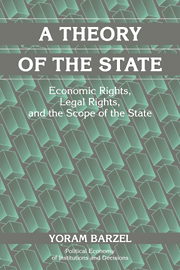Book contents
- Frontmatter
- Contents
- Preface
- 1 Introduction
- I The Emergence of Protection and Third-Party Enforcement
- 2 The State and the Enforcement of Agreements
- 3 Third-Party Enforcement and the State
- 4 The Choice among Enforcement Forms
- 5 Anonymous Exchange, Mixed Enforcement, and Vertical Integration
- 6 Jurisdictional Issues
- 7 Collective Action and Collective Decisions
- 8 Tying the Protector's Hands: The Agreement between Subjects and Protector
- II The Emergence of Legal Institutions
- III The Character of the State
- References
- Index
- Other Books in the Series
2 - The State and the Enforcement of Agreements
Published online by Cambridge University Press: 04 December 2009
- Frontmatter
- Contents
- Preface
- 1 Introduction
- I The Emergence of Protection and Third-Party Enforcement
- 2 The State and the Enforcement of Agreements
- 3 Third-Party Enforcement and the State
- 4 The Choice among Enforcement Forms
- 5 Anonymous Exchange, Mixed Enforcement, and Vertical Integration
- 6 Jurisdictional Issues
- 7 Collective Action and Collective Decisions
- 8 Tying the Protector's Hands: The Agreement between Subjects and Protector
- II The Emergence of Legal Institutions
- III The Character of the State
- References
- Index
- Other Books in the Series
Summary
A BEGINNING
The model developed here attempts to capture the emergence of social interactions. What should be its starting point? Knowing what is cause and what is effect is essential, and if one attempts to start at a relatively advanced stage of human development, disentangling effects and causes is exceedingly difficult. It is difficult to know which of the forces that might affect political institutions are exogenous and which are endogenous. Were it possible to go back in time to observe the sequence of development of such forces, this problem might be overcome. But at its dawn, coming out of the “primordial soup,” society left behind no social record. A social record is a by-product of social order, which did not exist at that early stage. It is not possible, then, to reconstruct faithfully the early conditions of human life. Instead, we must develop a model for that purpose. This is a problem similar to that of the origin of life, and Dennett's solution seems appropriate here also. Dennett (1995, p. 454) theorized about how life originated: “Since the relevant period was prehistoric, and since he [the evolutionist] had no fossil record to consult, his story would have to be rational reconstruction.”
What could constitute the model or at least a model of the beginning? A candidate for one of the starting assumptions is that humans socialized and cooperated with one another from the outset. To proceed, however, we must have answers to questions such as these: Were they then ruled autocratically, democratically, or in some other way? How specialized were individuals within groups? Were the groups small or large? No a priori way to come up with answers seems available.
- Type
- Chapter
- Information
- A Theory of the StateEconomic Rights, Legal Rights, and the Scope of the State, pp. 13 - 33Publisher: Cambridge University PressPrint publication year: 2001

